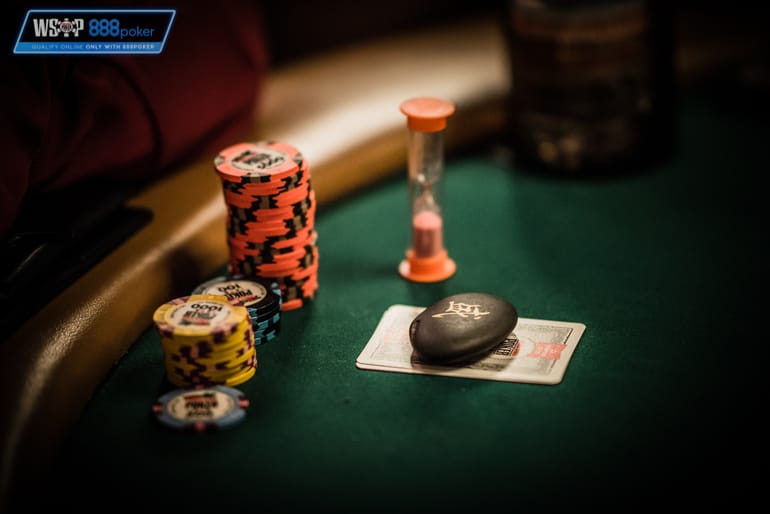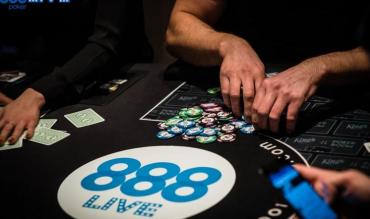I recently played a tournament where a player won back-to-back hands by calling with and hitting with a flush draw. She said a curious thing after the second hand. She said, “I was so surprised that it hit since I had already hit the flush in the previous hand.”
Why would she say such a thing? Obviously, she thought that having hit a flush the first time made hitting it a second time less likely. But is this true? Absolutely not! These are independent probabilities that have nothing to do with one another.
This is a classic gambler's fallacy example of the human brain trying to work out a pattern. Brains love to do this, and this type of thinking has a name: the Gambler’s Fallacy. It is also sometimes called the Monte Carlo fallacy after the Casino de Monte-Carlo, where it was observed in action in the early 1900s at the roulette wheel. If the wheel had hit black several times, patrons were sure red was more likely, and they bet accordingly. They behaved in this manner even though one had nothing to do with the other; thus, the term gambler’s fallacy was born.
The gambler’s fallacy occurs when we believe past events can predict future outcomes, even in random and independent situations. Let’s take a coin toss as a gambler's fallacy example. Assuming it’s a fair coin, it is possible to experience long strings of heads or tails. Suppose I have flipped a coin 50 times, and all 50 times, it came up heads. Do you think it is more likely that the 51st flip will come up tails because it is “due”? If you said yes, you’ve experienced the gambler’s fallacy. The results of a coin toss are independent of one another and have no impact on subsequent outcomes.
Poker is like this, too. Hitting a draw doesn’t make it more or less likely to occur again. The cards do not have a memory. Poker comes with a generous serving of randomness, but that can be hard for a pattern-recognizing machine like the brain to accept.
Why the Brain Falls for the Gambler’s Fallacy
Let’s dive deeper into why the brain works in this manner. Meet our first culprit - cognitive biases. These sneaky shortcuts our brains take can lead us down a particular path without realizing it.
Have you ever heard of the "representativeness heuristic"? It describes the brain's way of estimating probabilities by comparing how likely something is to happen to an existing mental prototype. In poker, if you've had a few good hands in a row, you might start thinking you're on a lucky streak and that your next hand is bound to be a winner too. But remember, the cards aren't tracking your past victories (or losses, for that matter). Each hand is its own separate deal, and the probabilities are independent.
There's also something called the "availability heuristic." This one's all about our tendency to give more weight to recent or vivid events. Playing poker, you tend to remember all the times your aces got cracked, but you forget all the mundane times when it won. I just had a student talk about how he has been beaten several times by 73o...
Conversely, your brain might trick you into believing that if you've just had many losses, you're "due" for a win. Your brain's ability to pull up those vivid memories of those losing hands makes it seem like they happen more often than they do.

Loss aversion is a cognitive bias that describes our tendency to feel the pain of losses more intensely than the pleasure of gains. In poker, it can supercharge the Gambler's Fallacy. Let's say you've been on a losing streak and are afraid of losing even more. The fear of losing can nudge you toward making riskier bets to "recover" your losses quickly. The Gambler's Fallacy might be whispering that a big win is just around the corner. But in reality, this can lead to suboptimal decisions and push you deeper into the hole.
Finally, let's talk about something that can trip up even the savviest players - the illusion of control. This happens when our brain convinces us that we have more control over random events than we do. In poker, this might manifest when players think their decisions can somehow influence the cards that come their way. You might find yourself tapping the table twice for good luck or believing your lucky charm will help you pull off a big win. But here's the scoop: Cards don't care about your lucky charm or table-tapping rituals. They follow their own rules, and your decisions should be grounded in logic and strategy, not in the illusion of control.
How the Gambler’s Fallacy Affects Your Poker Strategy
There are a few ways that the gambler’s fallacy can affect your playing decisions and bet-sizing decisions.
Imagine this: You've been dealt a series of subpar, unplayable hands, and your chips are slowly dwindling. The Gambler's Fallacy might pop into your head like an uninvited guest, telling you that a winning hand is just around the corner after such a nasty streak. This can lead you to make a classic rookie mistake - a gambler's fallacy example would be playing a hand you’d ordinarily fold, believing a win is ‘due. You might think, "I'm due to win, so I’ll take my chances with this subpar hand." But remember, each hand is a fresh start, and the cards don't carry any memory of your previous hands. It’s important not to deviate from proper strategy just because your mind is filled with fallacious thoughts.
Now, let’s take the opposite side of the coin. Pretend you have been on a hot streak and have won hand after hand. If the gambler’s fallacy comes into play, you’ll likely get concerned that a big loser is on the way! You might think, “I've been winning a lot, so it's time for my luck to run out." This can lead you to tighten up to prevent a loss which is not good for your long-term profitability. Proper value betting is where most of your profit comes from, so do not miss out on an opportunity just because your mind tells you something strange!
Mastering Logic to Beat Cognitive Biases in Poker
As you can see, several psychological mechanisms can trip you up at the poker table. Understanding these quirks of the mind is a foundational step to your long-term success. It can help you see through the illusion, stay in control, and make decisions based on logic rather than letting cognitive biases call the shots. Remember these insights, and you’ll be more likely to stack the odds in your favor.


